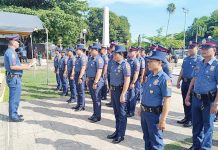[av_one_full first min_height=” vertical_alignment=” space=” custom_margin=” margin=’0px’ padding=’0px’ border=” border_color=” radius=’0px’ background_color=” src=” background_position=’top left’ background_repeat=’no-repeat’ animation=”]
[av_heading heading=’Martial law survivor on SC’s Marcos burial:
‘IT’S LIKE TORTURE!’ ‘ tag=’h3′ style=’blockquote modern-quote’ size=” subheading_active=’subheading_below’ subheading_size=’15’ padding=’10’ color=” custom_font=”]
BY MERIANNE GRACE EREÑETA
[/av_heading]
[av_textblock size=” font_color=” color=”]
ILOILO City – After hearing the Supreme Court decision allowing the burial of deposed dictator Ferdinand Marcos at the Libingan ng mga Bayani, activist Jose Ely Garachico felt a familiar pain. But it wasn’t physical; it was worse.
Garachico, now 60, was a victim of torture and political repression during the Marcos martial law years.
After graduating from college in 1977, Garachico joined cause-oriented groups demanding a stop to human rights violations and genuine democracy.
In September 1979, the seventh year of martial law, Garachico was arrested by operatives of the Military Intelligence Group and detained at Camp Delgado. He was suspected of being a communist.
“I was tortured. They wanted me to name my supposed communist comrades,” he said during a rally yesterday afternoon at Plazoleta Gay – a major downtown intersection – to protest the Supreme Court decision.
“Gina sapote ka. Sumbagon ka nga sumbagon asta mag-igod ka sa sobra nga kasakit (They would maul you. They wound hit you repeatedly until you crawl on the ground in pain),” recalled Garachico.
The painful experienced made him resolve to dedicated his life espousing the respect and protection of human rights.
But the torture went beyond the physical. It was also psychologically wracking experience.
“During sa investigation, may tuslukon ang dalungan mo. Kasahan ka sang pusil kag pitikon ka (They would pierce your ears. They would point a gun at you and threaten to pull the trigger),” recalled Garachico.
Garachico was released from military detention in January 1981. His parents pleaded with his captors to free him, he said.
The Supreme Court decision on Marcos’ burial at the Libingan ng mga Bayani was a big slap on the face of all martial law victims, he said.
“What about the plunder of the nation’s coffers, the systematic corruption, the extrajudicial killings, illegal arrests and human rights violations during the Marcos presidency? Why grant him hero status,” Garachico asked.
During yesterday’s indignation rally, local activists agreed the Supreme Court decision was an insult to all martial law victims.
“A hero’s burial for the deposed dictator is a mockery of and an insult to the Filipinos’ sacrifices and struggle for freedom and democracy. It is a thick-headed whitewash of the crimes that Marcos committed against the people,” said Reyland Vergara, spokesperson of Bagong Alyansang Makabayan (Bayan) – Panay.
Groups that joined Bayan-Panay included the Koalisyon sang mga Anti-Marcoses, Panay Alliance Karapatan and Ilonggo martial law victims.
On Tuesday, reading part of the Supreme Court’s summary of decision, the high tribunal’s spokesperson Atty. Theodore Te said, “There are certain things that are better left for history — not this court — to adjudge. The court could only do so much in accordance with clearly established rules and principles. Beyond that, it is ultimately for the people themselves, as the sovereign, to decide, a task that may require the better perspective that the passage of time provides. In the meantime, the country must move on and let this issue rest.”
But for the thousands that disappeared, summarily executed, tortured, raped, incarcerated and who experienced unspeakable horrors in the hands of Marcos’ martial law, Marcos is no hero, stressed Vergara.
The protesters lit candles to protest the Supreme Court decision.
In Manila, Marcos’ son and namesake, former senator and losing vice presidential bet Ferdinand “Bongbong” Marcos Jr. expressed hope that the Supreme Court decision “will lead the nation towards healing as we endeavor to move the country forward to give every Filipino a better life.”
But for Vergara, Marcos’ burial at the Libingan ng mga Bayani will not bring closure to a sad and horrible part of the country’s history.
“There will never be closure for as long as the Marcoses won’t acknowledge, apologize and make amends for the violations committed by the Marcos presidency,” he said./PN
[/av_textblock]
[/av_one_full]



